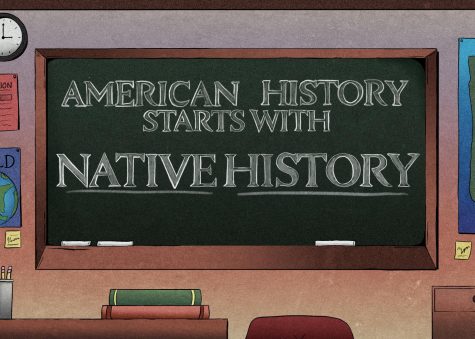New SDI event ‘HISTORYtalks’ explores Native American histories, underrepresentation in academia
November 21, 2022

From sugar-coated retellings of the first Thanksgiving to inaccurate imaginings of Columbus, Native American history and culture within education has long been mistreated and underrepresented — but one Columbia program is working to right this country’s wrongs.
Each year since 1990, the month of November is federally recognized as Native American Heritage Month. On campus, Student Diversity and Inclusion organized a number of events in honor of this: two trips to view the cultural history exhibits at the Field Museum and one on-campus conversation titled “HISTORYtalks: Natives of America.”
Anakaren Pinto, SDI events and education coordinator, created the HISTORYtalks program to host conversations not often had in classrooms. The Nov. 11 event, held in the SDI office located on the fourth floor of the 618 S. Michigan Ave. building, is the premiere event of a potentially reoccurring series.
SDI Director Charee Mosby-Holloway touched on the lack of education most Americans have as it pertains to Native American history and the effort to spark more conversations.
“The ways in which people become erased from history … white supremacy has made a concentrated effort to erase [Native American people] through violence, all kinds of things. But folks are still here; there are still incredibly beautiful, thriving communities,” Mosby-Holloway said.
Historian Eric Siemann was invited to give a presentation on campus about the historical treatment of Native American populations by the government with the hope of inspiring change through more extensive education.
“Some of the big takeaways will be understanding the origins of federal Native policy and extrapolating that to modern day to see how that is still affecting these groups, which hopefully then will lead to seeds of activism,” Siemann said of his presentation. “I’m hoping that people who [came] to this [event] will be inspired and want to take steps to promote the cause and correct some of the wrongdoings that have been brushed to the side.”
Siemann covered a variety of topics throughout his lecture, including misleading treaties and forced removals, as well as residential assimilation schools and performative activism.
Columbia currently has few courses dedicated to Native American history and culture.
C. Richard King is the chair of Columbia’s Humanities, History and Social Sciences Department and has an extensive background in Indigenous studies. He acknowledged the lack of sufficient courses at Columbia.
“I think not having more than a few classes on campus that deal with Native issues exclusively is problematic,” King said. “And it is a part of a larger pattern in which Native Americans and history are disappeared from conversations.”
King said there is only a brief time frame in which mainstream society engages with Native people’s history.
“Native Americans get remembered when white people want to remember Native Americans,” King said. “It runs roughly from what we still call Columbus Day until Thanksgiving.”
Pinto said she and her colleagues at SDI want to change this pattern. She is open to any and all subjects students or faculty may want to cover in future HISTORYtalks events. Pinto can be contacted at apinto@colum.edu.







